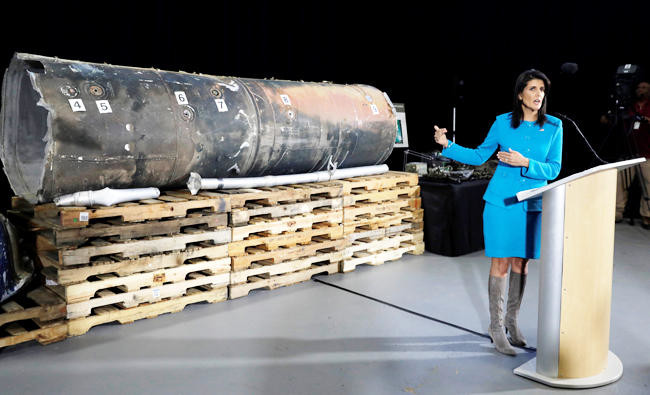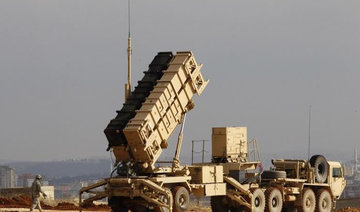JEDDAH: The US envoy to the UN, Nikki Haley, on Thursday unveiled declassified evidence that Iran is violating international law by funneling missiles to Houthi militias in Yemen.
The evidence included segments of missiles launched at Saudi Arabia from Houthi-controlled territory in Yemen. She displayed the missile parts in a hangar at a military base in Washington.
Haley said the parts bear markings showing that they originate in Iran, and have technical specifications that are specific to Iranian-manufactured weapons.
She said it was proof of “blatant violations” of UN Security Council resolutions while the international community was “looking the other way” because of the nuclear deal.
The US will “build a coalition to really push back against Iran and what they’re doing,” Haley told a news conference.
Pentagon spokeswoman Laura Seal said: “The US has long believed that Iran is providing weaponry to proxies and partners and militias throughout the region, and what we have here to show you today is proof.”
Saudi Arabia and the UAE had recovered the arms and loaned them to Washington, she added.
The unprecedented presentation by the Pentagon is part of its follow-through on President Donald Trump’s new Iran policy, which promises a far harder line toward Tehran.
Katie Wheelbarger, principal deputy assistant secretary of defense for international security affairs, said there could be implications of an accumulation of evidence against Iran.
“You could see future sanctions... but the first step is at least to bring awareness and understanding, and to have a similar picture of what we’re looking at,” Wheelbarger was quoted as saying by The Associated Press.
The Pentagon offered a detailed explanation of all the reasons why it believed the arms came from Iran, noting Iranian corporate logos on arms fragments and the unique nature of the designs of Iranian weaponry.
That included the designs of short-range Qiam ballistic missiles. The Pentagon said it had obtained fragments of two Qiam missiles, one fired on Nov. 4 and another on July 22.
The Pentagon cited corporate logos of Iranian defense firms on jet vanes that help steer the missile’s engine, and on the circuit board that helps drive its guidance system. It said the missile’s unique valve design is only found in Iran.
Tehran, the Pentagon said, appeared to have tried to cover up the shipment by disassembling the missile for transport, given the crude welding used to stitch it back together.
“The point of this entire display is that only Iran makes this missile. They haven’t given it to anybody else,” Seal said. “We haven’t seen this in the hands of anyone else except Iran and the Houthis.”
Earlier in the day, UN Secretary-General Antonio Guterres warned that Iran may be defying a UN call to halt ballistic missile development.
He said in a report to the Security Council that the UN is investigating Iran’s possible transfer of ballistic missiles to Houthi militias in Yemen that may have been used in launches aimed at Saudi Arabia on July 22 and Nov. 4.
The report on implementation of a UN resolution that endorsed the July 2015 nuclear deal was obtained Wednesday by AP.
In the report, Guterres said the UN is studying debris from missiles fired at Yanbu in Saudi Arabia on July 22 and at Riyadh on Nov. 4, and is reviewing other information.
He said France, Germany, Britain and the US sent a letter saying the Simorgh Space Launch Vehicle that Iran launched on July 27, if configured as a ballistic missile, is “inherently capable of delivering nuclear weapons.”
Saudi Arabia welcomed the UN report and US stand on Iran’s weapons supplies to the Houthis.
The Kingdom demanded immediate action to implement UN Security Council resolutions and hold Iran accountable for its actions, the Saudi Press Agency (SPA) reported.
"Iran's support for Houthi terrorist militias constitutes a flagrant violation of UN Security Council Resolutions No. 2216 and No. 2231, and has disrupted the political process and prolonged the crisis in Yemen," said an official statement on the Saudi Press Agency.
"Saudi Arabia calls upon the international community to take immediate action to implement the above-mentioned UN Security Council resolutions and to hold the Iranian regime accountable for its aggressive actions," the statement said. "Saudi Arabia reiterates the need to tighten the UN Verification and Inspection Mechanism (UNVIM) to prevent smuggling."
Gerald Feierstein, former US ambassador to Yemen and director for Gulf affairs and government relations at the Middle East Institute, told Arab News: “The fact that Iran has provided the Houthis with materiel support as well as training and assistance for at least the past five years is well-established.
“But providing the Houthis with the means to threaten major Saudi and perhaps Emirati population centers with missile attacks marks a serious escalation in the Yemen civil war, and reflects the desire of the Houthis and their Iranian patrons to draw Saudi Arabia more deeply into the conflict and regionalize it.”
Feierstein added: “The international community needs to redouble its efforts to prevent the flow of arms and support from Iran to the Houthis in order to bring this conflict to an end.”




























